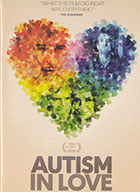
Autism in Love 2015
Distributed by Good Docs
Produced by Matt Fuller and Carolina Groppa
Directed by Matt Fuller
DVD, color, 75 min.
College - General Adult
Autism, Disabilities
Date Entered: 03/30/2016
Reviewed by Sheila Intner, Professor Emerita, Graduate School of Library & Information Science, Simmons College GSLIS at Mt. Holyoke, South Hadley, MAA lot of attention is paid to autistic children, but almost none to autistic people who are maturing and—exactly like their non-autistic counterparts—are searching for love. This nicely filmed documentary explores the love lives of four autistic adults: Lenny; Dave; Lindsey; and Stephen.
The four subjects live in different parts of the country (Los Angeles, Washington, D.C., and St. Paul) and their ages appear to be anywhere from early twenties to mid-forties. We see and hear from many of their parents, who appear to be doing their best to play supportive roles in their children’s lives. The film includes many interviews with each of the four as well as many scenes figuring importantly in the development of their relationships with members of the opposite sex. (None of the four seek to establish same sex relationships.)
The emotions that the film allows viewers to see the subjects experience run the gamut from Lenny’s loneliness, sadness, and anger resulting from an absence any satisfying relationships; to the slow-moving but joyous development of a deeply loving relationship between Dave and Lindsey, followed by their engagement; and, last of all, the loneliness and sadness that Stephen endures after Dita, his loving spouse of seventeen years, is stricken with cancer and dies. Their stories are portrayed with great sensitivity.
Technically, Autism in Love has some flaws, but, overall, is well-paced, well-edited, and has good camerawork for the most part. Its problems are few but important: a number of scenes are so dark the viewer can barely see the people and the action; and the audio disappeared entirely about 60 minutes into the film. Despite the lack of sound, this reviewer watched to the end and was happy to see that some of the subjects’ questions were resolved.
This film is an excellent resource for academic libraries supporting studies of autism and adult development as well as for public libraries in the many communities where autistic young people reside. Not only can the parents of autistic young people benefit from seeing that their children are not so different from “normal” children; but, adults whose children are not autistic can learn more about the added difficulties autistic people face as they grow into adulthood. It is not easy for any of us to find someone to love who returns that love and makes us feel happy and fulfilled.